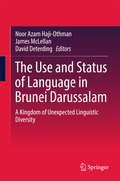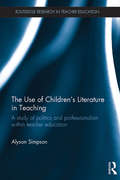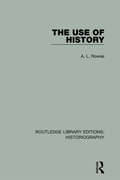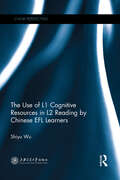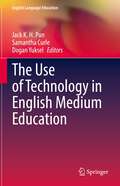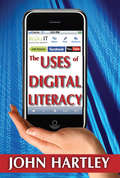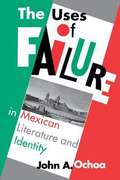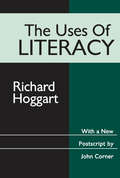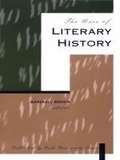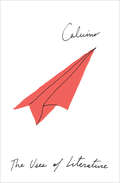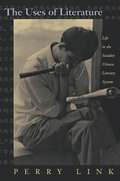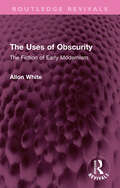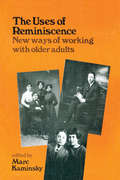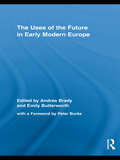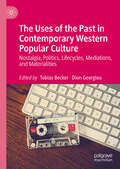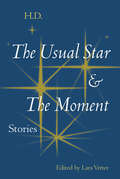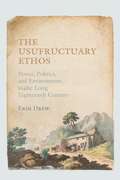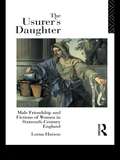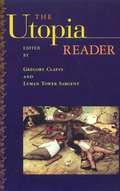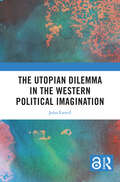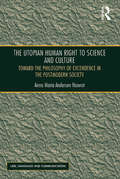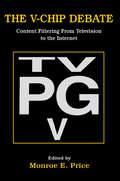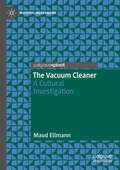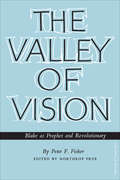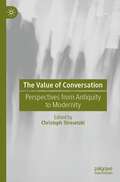- Table View
- List View
The Use and Status of Language in Brunei Darussalam
by James Mclellan David Deterding Noor Azam Haji-OthmanThis book provides an overview of the linguistic situation in Brunei, including a historical overview and a synopsis of the current education system. It investigates pronunciation, particularly the intelligibility of Brunei English and the vowels of Brunei Mandarin, and it also describes the acquisition of Malay grammar, Malay politeness strategies, the use of language online, language in the courts, a comparison of Malay and English newspapers, the language of shop signs, the status of Dusun, and lastly, English literature in Brunei.
The Use of Children's Literature in Teaching: A study of politics and professionalism within teacher education (Routledge Research in Teacher Education)
by Alyson SimpsonThe Use of Children's Literature in Teaching reveals the impact of politics, professional guidelines and restrictive measurements of literacy on the emerging identities of young teachers. It places renewed emphasis on the importance of creative teaching with children’s literature for the empowerment of teacher agency to enhance the learning of their students. Framing the debate alongside the issue of teacher autonomy, Simpson describes results from a two-year study, which brings together information from interviews, surveys, document analysis and digital stories from Australia, Canada, the UK and the US to assess the role of children’s literature in pre-service teacher education. Through cross-cultural comparison, this research captures the different levels of connection between politics, education systems, higher education and pre-service teachers. It exposes how politics, narrow views of professionalism and program structures in teacher education may adversely affect the development of pre-service teachers. This book presents a strong case that reading and responding critically to literary texts leads to better educational outcomes than basic decoding and low-level comprehension training. As such, this book will be of great interest to researchers and scholars working in the areas of teacher education and literacy and primary education. It should also be essential reading for teacher educators and policymakers.
The Use of History (Routledge Library Editions: Historiography)
by A. L. RowseThis book, originally published in 1963, discusses the place of history in education and general culture, methods of teaching and how to tackle reading. It deals with problems that are among the most pressing intellectual issues of the twentieth century as well as being a practical handbook, on how to read history.
The Use of L1 Cognitive Resources in L2 Reading by Chinese EFL Learners (China Perspectives)
by Shiyu WuThis book focuses on the effects of L1 cognitive resources on L2 reading e.g. the effects of L1 reading ability, the ability in L1 mental-structure building, L1 cognitive use in L2 reading, and other related cognitive mechanisms and capacities of EFL learners in China. It integrated test-based and product-oriented as well as VPA-based (verbal protocol analysis) and process-oriented experiments to address the problems of reading in a second language. This book provides several theoretical, methodological and pedagogical insights, including the multidimensional nature of L2 reading and Vygotskyan sociocultural theory as a suitable L2 reading framework, combined approaches on L2 studies, and the rewarding active use of L1 cognitive resources in L2 learning.
The Use of Technology in English Medium Education (English Language Education #27)
by Jack K. H. Pun Samantha Curle Dogan YukselThis volume discusses how the use of technology creates opportunities for effective teaching practice and illustrates ways to apply innovative and stimulating ways to engage and interact with students on-line. This research-led book brings together teaching practice and case studies and provides a comprehensive understanding of how technology can enhance teaching and learning through English as medium of instruction. It helps to further the understanding of challenges that language teachers and learners may experience, and provides suggested solutions to address these challenges. It also reflects on the use of technology trough case studies and practical tasks. This book brings theory and practice together and it informs research and classroom practices. It will therefore be of great value to teachers in training as well as to those already working or researching in the field.
The Uses of Digital Literacy (Creative Economy + Innovation Culture Ser.)
by John HartleyAt the heart of this book lies a reappraisal of humanities research and its use in understanding the conditions of a consumer-led society. This is an open, investigative, critical, scientific task as well as an opportunity to engage with creative enterprise and culture. Now that every user is a publisher, consumption needs to be rethought as action not behavior, and media consumption as a mode of literacy.Online social networks and participatory media are often still ignored by professionals, denounced in the press and banned in schools. But the potential of digital literacy should not be underestimated. Fifty years after Richard Hoggart's pioneering The Uses of Literacy reshaped the educational response to popular culture, John Hartley extends Hoggart's argument into digital media. Media evolution has made possible the realism of the modern age journalism, the novel and science not to mention mass entertainment on a global scale.Hartley reassesses the historical and global context, commercial and cultural dynamics and the potential of popular productivity through analysis of the use of digital media in various domains, including creative industries, digital storytelling, YouTube, journalism, and mediated fashion. Encouraging mass participation in the evolutionary growth of knowledge, The Uses of Digital Literacy shows how today's teenage fad may become tomorrow's scientific method. Hartley claims the time has come for education to catch up with entertainment and for the professionals to learn from popular culture. This book will stimulate the imagination and stir further research.
The Uses of Failure in Mexican Literature and Identity
by John A. OchoaWhile the concept of defeat in the Mexican literary canon is frequently acknowledged, it has rarely been explored in the fullness of the psychological and religious contexts that define this aspect of "mexicanidad. " Going beyond the simple narrative of self-defeat, The Uses of Failure in Mexican Literature and Identity presents a model of failure as a source of knowledge and renewed self-awareness. Studying the relationship between national identity and failure, John Ochoa revisits the foundational texts of Mexican intellectual and literary history, the "national monuments," and offers a new vision of the pivotal events that echo throughout Mexican aesthetics and politics. The Uses of Failure in Mexican Literature and Identity encompasses five centuries of thought, including the works of the Conquistador Bernal Díaz del Castillo, whose sixteenth-century True History of the Conquest of New Spain formed Spanish-speaking Mexico's early self-perceptions; José Vasconcelos, the essayist and politician who helped rebuild the nation after the Revolution of 1910; and the contemporary novelist Carlos Fuentes. A fascinating study of a nation's volatile journey towards a sense of self, The Uses of Failure elegantly weaves ethical issues, the philosophical implications of language, and a sociocritical examination of Latin American writing for a sparkling addition to the dialogue on global literature.
The Uses of Literacy: Aspects Of Working-lass Life (Classics In Communication And Mass Culture Ser.)
by Richard HoggartThis pioneering work examines changes in the life and values of the English working class in response to mass media. First published in 1957, it mapped out a new methodology in cultural studies based around interdisciplinarity and a concern with how texts-in this case, mass publications-are stitched into the patterns of lived experience. Mixing personal memoir with social history and cultural critique, The Uses of Literacy anticipates recent interest in modes of cultural analysis that refuse to hide the author behind the mask of objective social scientific technique. In its method and in its rich accumulation of the detail of working-class life, this volume remains useful and absorbing.Hoggart's analysis achieves much of its power through a careful delineation of the complexities of working-class attitudes and its sensitivity to the physical and environmental facts of working-class life. The people he portrays are neither the sentimentalized victims of a culture of deference nor neo-fascist hooligans. Hoggart sees beyond habits to what habits stand for and sees through statements to what the statements really mean. He thus detects the differing pressures of emotion behind idiomatic phrases and ritualistic observances.Through close observation and an emotional empathy deriving, in part, from his own working-class background, Hoggart defines a fairly homogeneous and representative group of working-class people. Against this background may be seen how the various appeals of mass publications and other artifacts of popular culture connect with traditional and commonly accepted attitudes, how they are altering those attitudes, and how they are meeting resistance. Hoggart argues that the appeals made by mass publicists-more insistent, effective, and pervasive than in the past-are moving toward the creation of an undifferentiated mass culture and that the remnants of an authentic urban culture are being destroyed.In his introduction to this new edition, Andrew Goodwin, professor of broadcast communications arts at San Francisco State University, defines Hoggart's place among contending schools of English cultural criticism and points out the prescience of his analysis for developments in England over the past thirty years. He notes as well the fruitful links to be made between Hoggart's method and findings and aspects of popular culture in the United States.
The Uses of Literary History
by Marshall BrownIn this collection, Marshall Brown has gathered essays by twenty leading literary scholars and critics to appraise the current state of literary history. Representing a range of disciplinary specialties and approaches, these essays illustrate and debate the issues that confront scholars working on the literary past and its relation to the present.Concerned with both the theory and practice of literary history, these provocative and sometimes combative pieces examine the writing of literary history, the nature of our interest in tradition, and the ways that literary works act in history. Among the numerous issues discussed are the uses of evidence, anachronism, the dialectic of texts and contexts, particularism and the resistance to reductive understanding, the construction of identities, memory, and the endurance of the past. New historicism, nationalism, and gender studies appear in relation to more traditional issues such as textual editing, taste, and literary pedagogy. Combining new and old perspectives, The Uses of Literary History provides a broad view of the field.Contributors. Charles Altieri, Jonathan Arac, R. Howard Bloch, Richard Dellamora, Paul H. Fry, Geoffrey Hartman, Denis Hollier, Donna Landry, Lawrence Lipking, Jerome J. McGann, Walter Benn Michaels, Rukmini Bhaya Nair, Virgil Nemoianu, Annabel Patterson, David Perkins, Marjorie Perloff, Meredith Anne Skura, Doris Sommer, Peter Stallybrass, Susan Stewart
The Uses of Literature: Essays
by Italo CalvinoIn these widely praised essays, Calvino reflects on literature as process, the great narrative game in the course of which writer and reader are challenged to understand the world. Calvino himself made the selection of pieces to be included in this volume. Translated by Patrick Creagh. A Helen and Kurt Wolff Book
The Uses of Literature: Life in the Socialist Chinese Literary System
by Perry LinkWhy do people in socialist China read and write literary works? Earlier studies in Western Sinology have approached Chinese texts from the socialist era as portraits of society, as keys to the tug-of-war of dissent, or, more recently, as pursuit of "pure art." The Uses of Literature looks broadly and empirically at these and many other "uses" of literature from the points of view of authors, editors, political authorities, and several kinds of readers. Perry Link, author of Evening Chats in Beijing, considers texts ranging from elite "misty" poetry to underground hand-copied volumes (shouchauben) and shows in concrete detail how people who were involved with literature sought to teach, learn, enjoy, explore, debate, lead, control, and resist. Using the late 1970s and early 1980s as an entree to the workings of China's "socialist literary system," the author shows how that system held sway from 1950 until around 1990, when an encroaching market economy gradually but fundamentally changed it. In addition to providing a definitive overview of how the socialist Chinese literary system worked, Link offers comparisons to the similar system in the Soviet Union. In the final chapter, the book seeks to explain how the word "good" was used and understood when applied to literary works in such systems. Combining aspects of cultural and literary studies, The Uses of Literature will reward anyone interested in the literature of modern China or how creativity is affected by a "socialist literary system."
The Uses of Obscurity: The Fiction of Early Modernism (Routledge Revivals)
by Allon WhiteOriginally published in 1981, this book examines why and how textual difficulty became a norm of modernist literature and questions how we can begin to account for the forms of obscurity and difficulty which developed in the late 19th Century and which became so important to modernism. The author argues that the decline of realism entailed the growth of ‘symptomatic’ or ‘subtextual’ reading which tended to treat fiction as compromised autobiography. This kind of reading left the author dangerously isolated and exposed in the midst of a newly sophisticated public. Within this general cultural perspective, the book traces the private anxieties that led George Meredith, Joseph Conrad and Henry James to conceal themselves within their complex and resistant fictions. It discusses opacity in the texts themselves – embarrassment and shame in Meredith; ‘engimas’ in Conrad; and the fear of vulgarity and knowledge in Henry James.
The Uses of Reminiscence: New Ways of Working With Older Adults
by Mark KaminskyThe meaning and value of reminiscence in the lives of elders is beautifully explored.
The Uses of the Future in Early Modern Europe (Routledge Studies in Renaissance Literature and Culture)
by Andrea Brady Emily ButterworthIs modernity synonymous with progress? Did the Renaissance really break with the cyclical, agrarian time of the Middle Ages, inaugurating a new concept of irreversible time in a secular culture defined by development? How does methodology affect scholarly responses to the idea of the future in the past? This collection of interdisciplinary essays from the fields of literary criticism, cultural studies, politics and intellectual history offers new answers to these commonplace questions. They explore elite and popular culture, women and men’s experiences, and the encounter between East and West, providing a comparative view on the range of personal, political and social practices with which early modern people planned for, imagined, manipulated or even rejected the future. Examining poetry, architecture, colonial exploration, technology, drama, satire, wills, childbirth and deathbed rituals, humanism, religious radicalism and republicanism, this collection provides new readings of canonical early modern texts and insights into popular culture. With a foreword by Peter Burke.
The Uses of the Past in Contemporary Western Popular Culture: Nostalgia, Politics, Lifecycles, Mediations, and Materialities
by Tobias Becker Dion GeorgiouThis book takes an interdisciplinary approach to understanding the different ways in which the past remains present in Western popular culture in the twenty-first century. It combines theoretical analyses with case study-based chapters focusing on examples from Britain, the US, and Germany, among other countries. In doing so, it pushes beyond a simplistic and monolithic conception of what ‘nostalgia’ is to allow for a more nuanced and varied conceptualisation of this phenomenon, and to also incorporate other ways of understanding the invoking or inclusion of different histories within cultural objects, formats, and practices.
The Usual Star and The Moment: Stories
by H. D.This scholarly edition makes available two little-known story collections by the modernist writer H.D., encouraging new ways of thinking about the role of the short story genre in H.D.’s life and career.
The Usufructuary Ethos: Power, Politics, and Environment in the Long Eighteenth Century
by Erin DrewAlthough a study of past ideas, The Usufructuary Ethos resonates with contemporary debates about our human responsibilities to the natural world in the face of climate change and mass extinction.
The Usurer's Daughter: Male Friendship and Fictions of Women in 16th Century England
by Lorna HutsonIn a bold and brilliantly persuasive series of moves, Lorna Hutson draws upon new historicist and feminist theories to examine closely Renaissance literature and the cultural impact of the humanist project. The Usurer's Daughter: * provides startling new readings of Shakespeare * takes an entirely new approach to classical scholarship * focuses attention on the central importance of the history of the representation of women * illuminates how social relations between men were textualised during the early modern period.
The Utopia Reader
by Gregory Claeys Lyman Tower SargentUtopian literature has given voice to the hopes and fears of the human race from its earliest days to the present. The only single-volume anthology of its kind,The Utopia Reader encompasses the entire spectrum and history of utopian writing-from the Old Testament and Plato's Republic, to Sir Thomas More's Utopia and George Orwell's twentieth century dystopia,Nineteen Eighty-Four, through to the present day. The editors of this definitive collection demonstrate the various ways in which utopias have been used throughout history as veiled criticism of existing conditions and how peoples excluded from the dominant discourse-such as women and minorities-have used the form to imagine empowering alternatives to present circumstances. An engaging tour through the dissident, polemic, and satirical tradition of utopian writing,The Utopia Reader ultimately provides a telling portrait of civilization's persistent need to imagine and construct ideal societies.
The Utopian Dilemma in the Western Political Imagination
by John FarrellIn this volume, John Farrell shows that political utopias—societies with laws and customs designed to short-circuit the foibles of human nature for the benefit of our collective existence—have a perennial opponent, the honor-based culture of aristocracy that dominated most of the world from ancient times into early modernity and whose status-based competitive psychology persists to the present day. While utopias aim at equality, the heroic imperative defends the need for personal and collective dignity. It asks the utopian, Do we really want to live in a world without struggle, without heroes, and without the stories they create? Because the utopian dilemma pits essential values against each other—equity versus freedom, dignity versus justice—few who confront it can simply take sides. Rather, the dilemma itself has been a generative stimulus for classic authors from Plato and Thomas More to George Orwell and Aldous Huxley. Farrell follows their struggles with the utopian dilemma and with each other, providing a deepened understanding of the moral and emotional dynamics of the western political imagination.
The Utopian Human Right to Science and Culture: Toward the Philosophy of Excendence in the Postmodern Society (Law, Language and Communication)
by Anna Maria NawrotThis book explores the question of whether the ideal right to science and culture exists. It proposes that the human right to science and culture is of a utopian character and argues for the necessity of the existence of such a right by developing a philosophical project situated in postmodernity, based on the assumption of ’thinking in terms of excendence’. The book brings a novel and critical approach to human rights in general and to the human right to science and culture in particular. It offers a new way of thinking about access to knowledge in the postanalogue, postmodern society. Inspired by twentieth-century critical theorists such as Levinas, Gadamer, Bauman and Habermas, the book begins by using excendence as a way of thinking about the individual, speech and text. It considers paradigms arising from postanalogue society, revealing the neglected normative content of the human right to science and culture and proposes a morality, dignity and solidarity situated in a postmodern context. Finally the book concludes by responding to questions on happiness, dignity and that which is social. Including an Annex which presents the author’s private project related to thinking in the context of the journey from ’myth to reason’, this book is of interest to researchers in the fields of philosophy and the theory of law, human rights, intellectual property and social theory.
The V-chip Debate: Content Filtering From Television To the Internet (Routledge Communication Series)
by Monroe E. PriceThe V-chip is a highly significant part of the discussion about whether television (or broadcasting in general) deserves some special attention in terms of its accessibility to children, its particular power to affect conduct, and its invasiveness. But as this notion of filtering and labeling has caught the imagination of the regulator, the legislator, and all those who wish to consider new ways to alter bargaining over imagery in society, the very idea of the V-chip or its equivalent is moving across other technologies, including the Internet. The V-chip issue has also fueled the ongoing debate about violence and sexual practices in society, and how representations on television relate to those practices. Although the initial concept of the V-chip is simple, its flow into the public realm raises so many extraordinary questions that the introduction and production of the chip virtually serves as a case study in problems of law and public policy. The very conceptualization of speech in society is being affected by this issue. Accordingly, the place of the V-chip in this debate is increasingly important; indeed, it may be argued that the V-chip's contribution to legal argumentation may be greater than its ultimate contribution to the relationship between children and imagery. Among the questions the contributors address are: *What research basis is necessary to require a framework for labeling and rating? *What relationship between government and the image-producing industries can be characterized--for constitutional and other reasons--as voluntary as opposed to coercive? *Who should evaluate these images? *To what extent should the evaluation process be centralized and/or distributed? *What assessment is appropriate to evaluate whether the experiment is "successful?" In addition to the V-chip's origin's in Canada and its further evolution in the United States, this book discusses the development of the V-chip and television rating systems in Europe, Australia, and throughout the world. It also includes essays which contrast the very different approaches in Canada and the United States in terms of the role of regulatory agency, industry, and government.
The Vacuum Cleaner: A Cultural Investigation (Material Modernisms)
by Maud EllmannThis book offers an entertaining study of the facts and fantasies associated with the vacuum cleaner as it evolved from a luxury gimmick to a household necessity. The iconic appliance of twentieth-century domestic revolution, the vacuum cleaner stands at the forefront of radical changes in technology, automation, finance, marketing, hygiene, infrastructure, time-management, domestic labour, and the history of dirt. This appliance also insinuates itself into the dominant phobias of the period, including totalitarianism and nuclear war. Maud Ellmann shows how modern literature, art, and other media have transformed this humble domestic mod con into a curmudgeon, windbag, cannibal, vampire, dictator, infanticidal mother, freedom fighter, mantrap, and lothario.
The Valley of Vision: Blake as Prophet and Revolutionary (University of Toronto Department of English Studies and Texts #9)
by Northrop Frye Peter FisherThe author of this important contribution to the study of Blake was tragically drowned in a sailing accident when he had almost completed it in manuscript. His was a critical mind of singular erudition and power. As is abundantly evidenced in these chapters which Northrop Frye has prepared for publication. Fisher had made a careful study of Oriental philosophy and of Plato and the Neo-Platonists and this background enabled him to make an original and fruitful analysis of his central interest, Blake. The book is not a study of Blake's sources but of his context. The author is trying to answer the question: given Blake's general point of view, why does he make the specific judgments he does make, judgments which so often seem merely glib or petulant or perverse. Blake himself, in explaining a painting, remarked: "It ought to be understood that the Persons, Moses & Abraham, are not here meant, but the States Signified by those Names." Fisher explains what Blake meant by "states," and shows that such names as Plato, Bacon or Newton, or such terms as "priest" or "deist" in Blake's writings, refer not to individuals but to cultural forces in Western civilization, the influence of which accounted for the social conditions that Blake attacked. The attack itself, Fisher shows, was based on a revolutionary dialectic, a sense of the underlying opposition between reactionaries committed to obscurantism and social injustice, the "Elect" as Blake calls them, and the prophets committed to a greater vision (the "Reprobate"), with the mass of the public (the "Redeemed") in between.
The Value of Conversation: Perspectives from Antiquity to Modernity
by Christoph StrosetzkiWhat is the value of conversation measured by? Are there more valuable and inferior types of conversation? What role do the contents, the people, and the circumstances play? Do times and epochs shape their own conversations? Conversation norms from handbooks as well as conversations reproduced in texts or reconstructed from texts shed light on these questions. The contributions in this volume are grouped around conceptual questions, specific contexts such as the salon and the table conversation, bring studies on individual literary texts and cover the European cultural history from Plato to the 20th century.
